Your search “www.worldcoalition.org/media/resourcecenter/WD2020_FactsheetParliamentarians_FR.pdf”
Document(s)
The Death Penalty For Drug Offences: Global Overview 2023
By Harm Reduction International, on 28 March 2024
2024
NGO report
Drug Offenses
More details See the document
Published in 2023.
At the end of 2023, 34 countries retained the death for drug offences. In July 2023 Pakistan took the landmark decision to remove the death penalty from the list of punishments that can be imposed for certain violations of its Control of Narcotics Substances Act. This year also saw notable progress in Malaysia, which abolished the mandatory death penalty for all offences, including drug-related ones. This reform may impact the lives of over 700 people on death row for drug offences and bring the country one step closer to total abolition of capital punishment. In stark contrast to these positive developments is the record-high number of drug-related executions in 2023 at least 467. Of those executed, at least 59 people belonged to ethnic minority groups (in Iran and in Singapore), 13 individuals were foreign nationals, and six were women. These figures confirm that these groups are uniquely vulnerable to capital punishment as a tool of drug control. Despite not accounting for the dozens, if not hundreds, of executions believed to have taken place in China, Vietnam, and North Korea, the 467 executions that took place in 2023 represent a 44% increase from 2022.
- Document type NGO report
- Themes list Drug Offenses
Document(s)
NGO Media Outreach: Using the Media as an Advocacy Tool
By Coalition for the International Criminal Court, on 1 January 2003
2003
Working with...
More details See the document
A guide for NGOs to use media effectively. This guide explains the importance of media, how to create contacts, how to prepare a media outreach campaign, how to deliver a campaign to the media and how to use available resources to support your media campaign.
- Document type Working with...
- Themes list Networks,
WD2019QUNO_Media_EN-1.pdf
on 8 September 2020
2020
WD2019QUNO_Media_FR-1.pdf
on 8 September 2020
Document(s)
The Death Penalty in Kenya: A Punishment that has Died Out in Practice, Part One – A Public Ready to Accept Abolition
on 15 June 2022
2022
NGO report
Kenya
Public Opinion
More details See the document
In 2021, The Death Penalty Project and the Kenya National Commission on Human Rights, in partnership with the Australian National University commissioned Prof. Carolyn Hoyle, Director of The Death Penalty Research Unit, at the University of Oxford, to undertake research in order to provide accurate data on attitudes towards the death penalty in Kenya and facilitate a constructive conversation on the future of capital punishment. The research examined the views of both the general public in Kenya and also opinion formers, those considered influential in shaping, and responding to, national views.
Key findings:
– 40% in favour of abolishing the death penalty, 10% did not know either way
– 51% in favour of retaining the death penalty, only 32% strongly in favour
– Those against the death penalty believed that criminals deserved the opportunity for rehabilitation.
– Knowledge of the death penalty appears to be limited, just 66% were aware Kenya retains the death penalty and just 21% knew no executions had take place in the past 10 years
– The public expressed concerns around the possibility that innocent people could be sentenced to death: 61% of the public – including retentionists – thought that ‘many’ or ‘some’ innocent people have been sentenced to death in Kenya; only 8% thought that ‘no innocent people have been sentenced to death’
– Public support fell from 51% to 31% when considering abolition in the region
59% of the public, who were initially in favour of retention, said that they would accept a new policy of abolition
- Document type NGO report
- Countries list Kenya
- Themes list Public Opinion
Document(s)
More Indicators of the Falling Support for the Death Penalty
By Talia Roitberg Harmon and Michael L. Radelet, California Western International Law Journal , on 1 February 2024
2024
Academic Article
United States
More details See the document
Published on October 12, 2023.
In the seminal Furman v. Georgia case from 1972, the U.S. Supreme Court (in effect) invalidated all death penalty statutes then inforce in American jurisdictions. After many states went back to their legislative drawing boards, some of the revised statutes were approved by the Court in 1976. At that time, Gallup found that 66 percent of the American public supported the death penalty, while 26 percent stood opposed. While support grew to 80 percent in 1994, a recent Gallup Poll from October 2022 shows that this figure has dropped to 55 percent. Recently, only 36 percent of Americans still support the death penalty given the alternative punishment of life imprisonment.
- Document type Academic Article
- Countries list United States
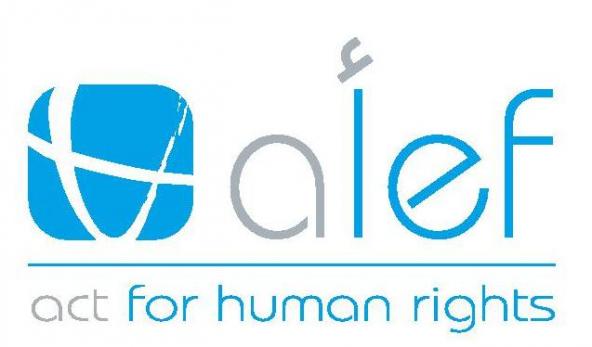
Member(s)
Association Libanaise pour l’Education el la Formation (ALEF)
on 30 April 2020
ALEF’s core mandate is Monitoring and Advocacy. Its main concern are Human Rights issues, thus the organization has been advocating against death penalty. Currently our project activities are the following: Death Penalty Abolition Activities in Lebanon- ALEF – act for human rights 1- Competition on the Best Human Rights Defense (Moot Court Simulation) Law students […]
2020
Lebanon
Document(s)
TESTIMONIES- 21 st World Day Against the Death Penalty
on 10 July 2023
2023
Campaigning
World Coalition
frMore details Download [ pdf - 759 Ko ]
This document has been compiled by the Secretariat of the World Coalition Against the Death Penalty with substantial aid from member organizations, including Abdorrahman Boroumand Center, Amnesty International, Cornell Center on the Death Penalty Worldwide, Free Mumia ! French Support Group (Collectif français “Libérons Mumia !”), German Coalition Against the Death Penalty, Justice Project Pakistan, […]
- Document type Campaigning / World Coalition
- Available languages TEMOIGNAGES - 21ème Journée mondiale contre la peine de mort
Document(s)
Qatar – Human Rights Committee – Death Penalty – January 2022
on 31 January 2022
2022
NGO report
World Coalition
Qatar
More details Download [ pdf - 236 Ko ]
Qatar had been maintaining a de facto moratorium on executions since 2000, but courts continued to sentence people to death. In 2020, however, Qatar executed a Nepali migrant worker by firing squad. Qatar’s death penalty practices are not in compliance with the Covenant. Qatar does not limit the death penalty to the most serious crimes, it is not taking steps toward a de jure moratorium on executions or ratification of the Second Optional Protocol, and it does not ensure that defendants in capital cases have a fair trial. Recent history suggests that a migrant worker may be more likely to be sentenced to death and executed for killing a Qatari national, as opposed to a non-citizen. Migrant workers are particularly vulnerable in the context of the country’s criminal legal system.
- Document type NGO report / World Coalition
- Countries list Qatar
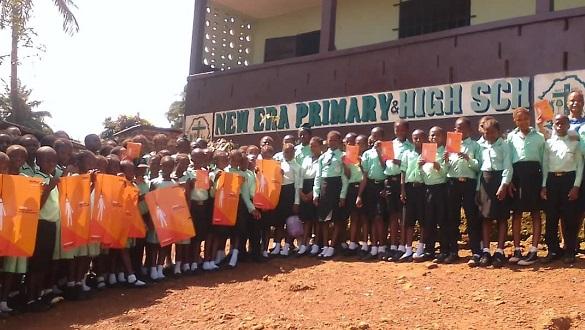
Article(s)
Child rights highlighted on the 17th World Day Against the Death Penalty
By Dinda Royhan, Majdoulin Sendadi, on 25 November 2019
On 10 October 2019, we celebrated the 17th World Day against the Death Penalty with various activities aimed to raise awareness on the death penalty and children as its unseen victims. Abolitionist forces in the two continents that gather most retentionist countries, Africa and Asia, were particularly active in raising awareness on the necessity to abolish the death penalty and its impacts on children this year.Through conferences, meetings, exhibitions, art installations, prison visits, radio broadcasts, flash mobs, dances and many other kinds of events, abolitionist forces in every continent took action to raise awareness about the use of death penalty in their national jurisdiction. The death penalty not only violates the fundamental right to life, but it also impacts the rights of children when the State sentences or executes a parent and has been found to have a long-term impact on the child’s best interest.
2019
Juveniles
Article(s)
Program and Admin Assistant (Trainee)
By World Coalition Against the Death Penalty, on 9 October 2018
The World Coalition Against the Death Penalty recruits an intern for a period of 6 months starting in September 2019.
2018
Article(s)
Translations in Chinese
By World Coalition Against the Death Penalty, on 21 January 2013
The World Coalition Against the Death Penalty’s office in Paris, France, is currently calling for translation contributions in Chinese.
The objective is to award contracts for translation services for the publications of the World Coalition Against the Death Penalty for 30 months (mid 2013 – mid 2015).
2013
Article(s)
WANTED: Program and Admin Assistant
By World Coalition Against the Death Penalty, on 19 August 2016
The World Coalition Against the Death Penalty is looking for an intern for a period of 6 months, starting mid-September.
2016
Article(s)
Program and Admin Assistant
By World Coalition Against the Death Penalty, on 5 January 2017
The World Coalition Against the Death Penalty recruits interns twice a year for a period of 6 months (from March to August and from September to February).
2017
Article(s)
Program and Admin Assistant (Trainee)
By World Coalition Against the Death Penalty, on 31 March 2020
The World Coalition Against the Death Penalty is recruiting an intern for a period of 6 months going from mid-June to mid December 2020.
2020
Document(s)
2020 Activity Report
By World Coalition Against the Death Penalty, on 9 September 2021
2021
World Coalition
frMore details Download [ pdf - 496 Ko ]
Activity Report of the World Coalition Against the Death Penalty for 2020, as adopted by its General Assembly on 18 June 2021
- Document type World Coalition
- Available languages Rapport d'Activité 2020
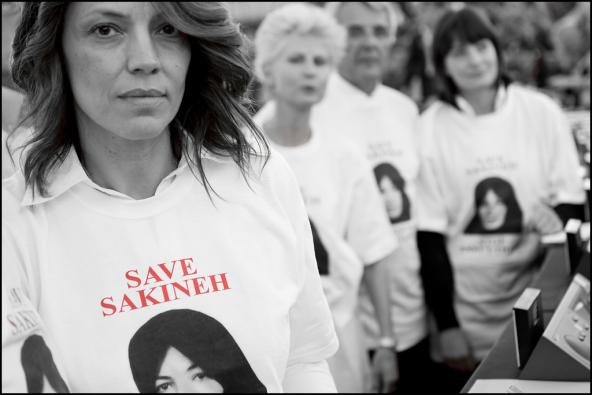
Article(s)
‘Sakineh’ campaign to culminate in worldwide protests
on 25 August 2010
What started as an effort to save an Iranian woman sentenced to death by stoning is turning into a global movement for human rights and against capital punishment.
2010
Cruel, Inhuman and Degrading Treatment and Punishment
Iran (Islamic Republic of)
Public Opinion
Document(s)
Ethiopia – Committee Against Torture (LOI) – Death Penalty – June 2022
on 21 July 2022
2022
NGO report
World Coalition
Ethiopia
More details Download [ pdf - 1447 Ko ]
This report addresses Ethiopia’s compliance with its human rights obligations with regard to the death penalty. Although there are currently at least 147 people on death row in Ethiopia, the country has not carried out any executions during the reporting period and has also pardoned and released 41 additional death row inmates since that time.[1] The Federal Supreme Court of Ethiopia has also issued sentencing guidelines that purport to further reduce the likelihood of persons being sentenced to death as a punishment for their crimes.[2] Nonetheless, Ethiopia has not taken concrete steps to reduce the number of crimes eligible for the death penalty, and the use of torture and other due process violations related to judicial proceedings render all death sentences arbitrary.
- Document type NGO report / World Coalition
- Countries list Ethiopia
Document(s)
2021 World Day Report
on 10 June 2022
2022
World Coalition
Women
frMore details Download [ pdf - 4154 Ko ]
On 10 October 2021, the World Coalition and abolitionists around the world celebrated the 19th World Day Against the Death Penalty (‘World Day’). Every year on World Day, the World Coalition highlights one problematic aspect of the Death Penalty. In 2021, the World Day explored the theme “Women sentenced to death, an invisible reality” to raise awareness on how the treatment of gender and gender-based inequalities create particularly precarious conditions for women sentenced to capital punishment. This report presents the activities organised for the 19th World Day and the media coverage it received.
- Document type World Coalition
- Themes list Women
- Available languages Rapport journée mondiale 2021
Document(s)
The Illusion of Heightened Standards in Capital Cases
By Anna VanCleave, University of Connecticut - School of Law, on 25 January 2024
2024
Article
Fair Trial
United States
More details See the document
Published on April 3, 2023.
The death penalty has gained its legitimacy from the belief that capital prosecutions are more procedurally rigorous than noncapi-tal prosecutions. This Article reveals how a project of heightened capital standards, set in motion when the Supreme Court ended and then revived the death penalty, was set up to fail.
In establishing what a constitutional death penalty would look like, the Court in 1976 called for heightened standards of reliability in capital cases. In the late 1970s and early 80s, the Supreme Court laid out specific constitutional procedures that must be applied in capital cases, and left the door open for the Eighth Amendment to do even more. In the decades that followed, state and federal courts have fueled a perception of heightened procedural rigor in capital cases by referring repeatedly to the heightened standards applica-ble in capital cases.
- Document type Article
- Countries list United States
- Themes list Fair Trial

Member(s)
The Advocates for Human Rights
on 30 April 2020
The mission of The Advocates for Human Rights is to implement international human rights standards in order to promote civil society and reinforce the rule of law. By involving volunteers in research, education, and advocacy, The Advocates build broad constituencies in the United States and select global communities. In 1991, The Advocates adopted a formal […]
2020
United States
Document(s)
Death by Design: Part 2
By The Wren Collective, on 23 January 2024
2024
NGO report
Legal Representation
United States
More details See the document
Published in December 2023.
In “Death by Design” Parts 1 and 2, Wren investigated the state of court-appointed capital representation in Harris County—the death penalty capital of the world. The second report examines why that poor representation has thrived, and the ways that the judges overseeing those cases have enabled it to continue that way.
Wren recommends a total overhaul to the system of capital representation for poor defendants in Harris County, with either the public defender absorbing those cases or the judges establishing a new, freestanding capital public defender that is independent from judicial oversight.
- Document type NGO report
- Countries list United States
- Themes list Legal Representation
Document(s)
“No One Believed Me”: A Global Overview of Women Facing the Death Penalty for Drug Offenses
on 5 October 2021
2021
NGO report
Drug Offenses
Women
frMore details See the document
“No one believed me” is a quote from Merri Utami, who was sentenced to death for drug trafficking in Indonesia in 2002. Her quote reflects the injustices faced by women accused of capital drug offenses around the world: many decision-makers disbelieve women’s plausible innocence claims or discount the effects of relationships and economic instability on women’s decisions to traffic drugs.
Document(s)
Iraq – Committee Against Torture – Death Penalty – March 2022
on 18 March 2022
2022
NGO report
World Coalition
Iraq
More details Download [ pdf - 250 Ko ]
This report provides an update to the coauthors’ report at the List of issues stage and responds to the State party’s responses to the Committee’s questions in the List of issues that touch on the death penalty.
- Document type NGO report / World Coalition
- Countries list Iraq
Document(s)
Palestine – Committee Against Torture – Death Penalty – June 2022
on 21 July 2022
2022
NGO report
World Coalition
State of Palestine
More details Download [ pdf - 1747 Ko ]
The State of Palestine on 1 April 2014 ratified the Convention against Torture and Other Cruel, Inhuman or Degrading Treatment or Punishment. On 28 December 2017, the State of Palestine signed the Optional Protocol to the Convention against Torture and Other Cruel, Inhuman or Degrading Treatment or Punishment. On 18 March 2019, the State of Palestine also ratified the Second Optional Protocol to the International Covenant on Civil and Political Rights (ICCPR), which aims to abolish the death penalty. The State of Palestine has not yet abolished the death penalty. Indeed-as described herein-the 14 June 2007 split in power between the Palestinian Authority in Ramallah in the West Bank under President Abbas, and the Hamas movement in Gaza, has been followed by many documented executions in Gaza without the requisite signature of President Abbas, and Gazan military courts conduct trials of civilians, where they can be sentenced to death.
This report considers the prevalence of torture and other issues ancillary to the death penalty itself: confessions under torture or degrading treatment, due process, access to legal counsel, death-row conditions, and methods of execution.
- Document type NGO report / World Coalition
- Countries list State of Palestine
WD2020_MobilizationKit_AR
on 10 September 2020
2020
Article(s)
Call for actions in Barbados and Eastern Caribbean
By Greater Caribbean For Life and World Coalition Against the Death Penalty, on 10 July 2018
As part of a joint project which aims to create a platform for death penalty reform in Barbados and the Eastern Caribbean, the Greater Caribbean For Life (GCL) and the World Coalition are lanching a call for actions.
2018
Barbados
Article(s)
Call for actions on World Day in the Maldives and Turkey
By World Coalition Against the Death Penalty, on 17 June 2020
The World Coalition Against the Death Penalty and its 14 international member organizations active in the Philippines, the Maldives and Turkey are part of a joint project which aims to combat the resurgence of the death penalty, particularly in the aforementioned three countries at risk.
2020
Maldives
Turkey

Article(s)
Call for actions on World Day in the Philippines
By World Coalition Against the Death Penalty, on 1 July 2020
The World Coalition Against the Death Penalty and its 14 international member organizations active in the Philippines, the Maldives and Turkey are part of a joint project which aims to combat the resurgence of the death penalty, particularly in the aforementioned three countries at risk.
2020
Philippines
Article(s)
Call for actions on World Day in Sub-Saharan Africa 2
By World Coalition Against the Death Penalty, on 17 June 2020
The World Coalition Against the Death Penalty (World Coalition) and FIACAT are part of a joint project which aims to contribute to the abolition of the death penalty in Sub-Saharan Africa.
2020
Burkina Faso
Burundi
Cameroon
Congo
Côte d'Ivoire
Democratic Republic of the Congo
Ghana
Guinea
Kenya
Liberia
Mauritania
Niger
Senegal
Sierra Leone
Togo
United Republic of Tanzania
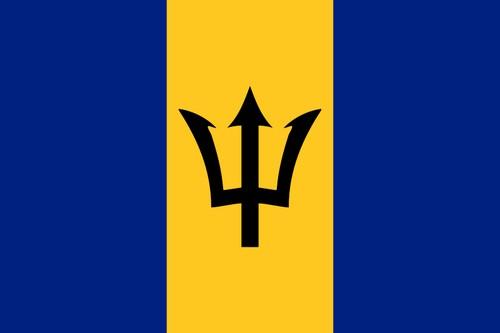
Article(s)
Call for actions on World Day in Barbados and the Eastern Caribbean States
By World Coalition Against the Death Penalty, on 1 July 2020
The Greater Caribbean For Life (GCL) and the World Coalition Against the Death Penalty are part of a joint project, led by The Death Penalty Project and funded by the European Union, which aims to create a platform for death penalty reform in Barbados and the Eastern Caribbean, leading to eventual abolition
2020
Barbados
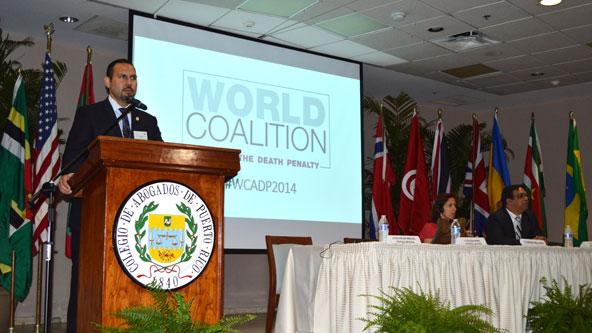
Article(s)
AGM focuses on mental health and progress in the Caribbean
By Inès Oulmokhtar, on 16 May 2014
The World Coalition is holding its General Assembly between 20-22 June in San Juan, Puerto Rico and invites the public to take part in the event.
2014
Puerto Rico
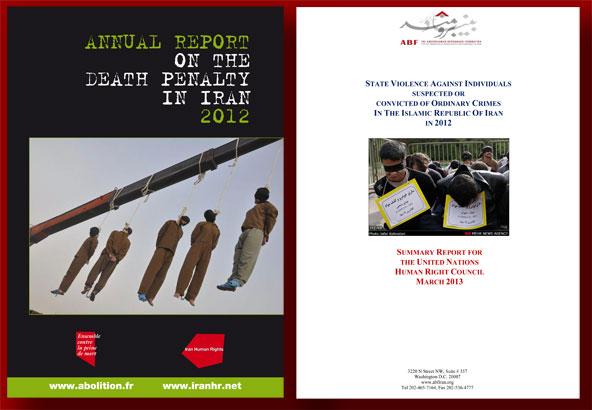
Article(s)
“Iran kills for possession of less than 50g of drugs”
By Thomas Hubert, on 9 April 2013
Annual reports published by two World Coalition member organizations of Iranian exiles expose the disproportionate use of the death penalty in Iran, mostly against drug users and traffickers.
2013
Drug Offenses
Iran (Islamic Republic of)
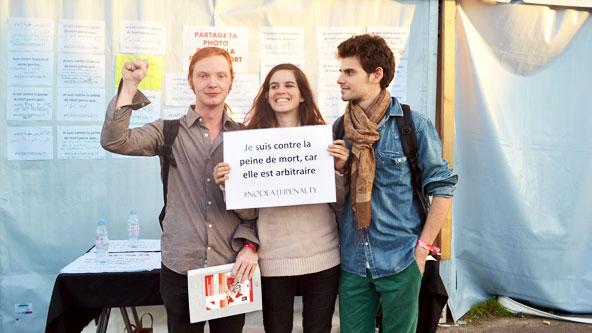
Article(s)
ECPM takes social media campaign to the fair ground
By Bronwyn Dudley, on 16 September 2014
World Coalition member organisation Ensemble contre la peine de mort (ECPM) was at September’s Fête de l’Humanité in Paris to spread awareness of the 12th World Day Against the Death Penalty on October 10.
2014
France
Intellectual Disability
Mental Illness
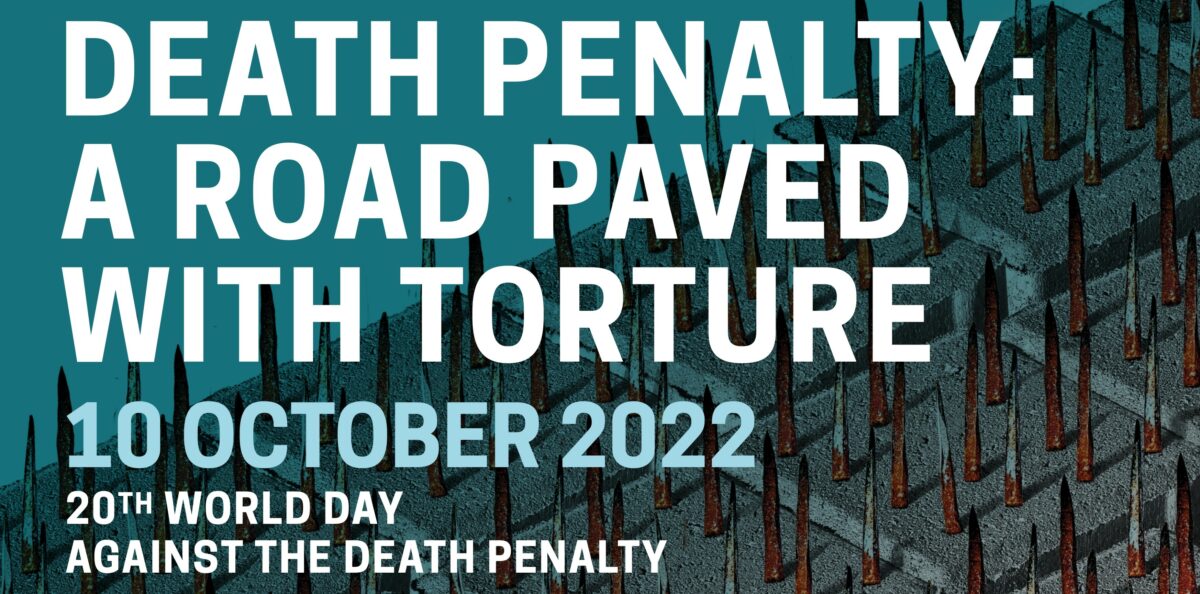
Article(s)
A Look Back at the 20th Anniversary of the World Day Against the Death Penalty
By Dunia Schaffa, on 27 January 2023
“Psychologically I am no longer human.”. This tweet by the World Organization Against Torture, quoting an interview with Richard Yav, a former security guard who was wrongly sentenced to death for 20 years in Benin, sheds light on the various impacts of torture.
2023
Cruel, Inhuman and Degrading Treatment and Punishment
Death Row Conditions
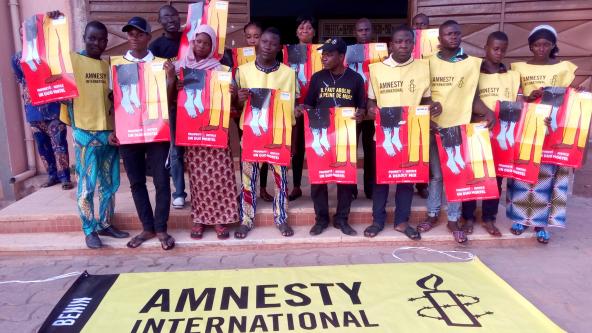
Article(s)
Strong mobilization in Sub-Saharan Africa on World Day
By Thalia Gerzso, on 19 October 2017
On October 10, 2017, all the abolitionists all around the world joined their forces to celebrate the 15th World Day Against the Death Penalty. The mobilization was particularly strong in Sub-Saharan Africa where many events were organized. Thus, the pugnacity of African abolitionists put the abolition of the death penalty at the heart of every discussion.
2017
Public Opinion
Article(s)
Internship opportunity at Centre on the Death Penalty, NLU Delhi
By NLU Delhi, on 1 April 2016
The Centre on the Death Penalty is keen to develop a robust and rewarding internship programme that will provide meaningful exposure to the complexities and nuances, in particular, of the administration of the death penalty and the criminal justice system in India more generally, therefore the centre introduces internship program where they accept interns on rolling basis.
2016
India
Document(s)
Getting to Death: Race and the Paths of Capital Cases after Furman
By Fagan, Jeffrey and Davies, Garth and Paternoster, Raymond, Columbia Public Law Research Paper, Forthcoming, Cornell Law Review, Vol. 107, No. 1565, 2022, on 13 January 2023
2023
Academic report
Fair Trial
United States
More details See the document
Decades of research on the administration of the death penalty have recognized the persistent arbitrariness in its implementation and the racial inequality in the selection of defendants and cases for capital punishment. This Article provides new insights into the combined effects of these two constitutional challenges. We show how these features of post-Furman capital punishment operate at each stage of adjudication, from charging death-eligible cases to plea negotiations to the selection of eligible cases for execution and ultimately to the execution itself, and how their effects combine to sustain the constitutional violations first identified 50 years ago in Furman. Analyzing a dataset of 2,328 first- degree murder convictions in Georgia from 1995–2004 that produced 1,317 death eligible cases, we show that two features of these cases combine to produce a small group of persons facing execution: victim race and gender, and a set of case-specific features that are often correlated with race. We also show that these features explain which cases progress from the initial stages of charging to a death sentence, and which are removed from death eligibility at each stage through plea negotiations. Consistent with decades of death penalty research, we also show the special focus of prosecution on cases where Black defendants murder white victims. The evidence in the Georgia records suggests a regime marred less by overbreadth in its statute than capriciousness and randomness in the decision to seek death and to seek it in a racially disparate manner. These two dimensions of capital case adjudication combine to sustain the twin failures that produce the fatal lottery that is the death penalty.
- Document type Academic report
- Countries list United States
- Themes list Fair Trial
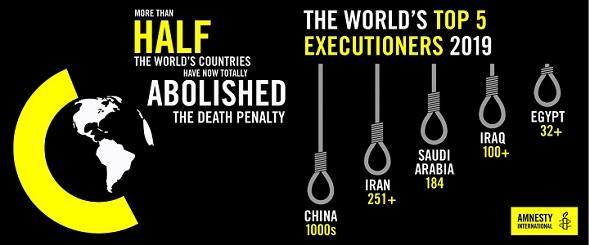
Article(s)
Death penalty in 2019: Facts and figures
By Amnesty International, on 22 April 2020
Amnesty International published its annual report on death sentences and executions worldwide on 21 April 2020. It showed that the number of known executions decreased slightly on the 2018 total, reaching the lowest figure in more than 10 years, despite Iraq nearly doubling its tally and Saudi Arabia having its highest executions total in any given year.
2020

Member(s)
Ensemble contre la peine de mort (ECPM)
on 30 April 2020
Since 2000, Together against the Death Penalty (Ensemble contre la peine de mort – ECPM) acts to fight against the death penalty around the world. The association promotes the universal abolition through the creation and dissemination of publications and teaching tools, as part of public campaigns and lobbies governments at both national and international levels. […]
2020
France
Document(s)
Explaining the Invidious: How Race Influences Capital Punishment in America
By Sheri Lynn Johnson, James and Mark Flanagan, Cornell Law School, on 1 September 2022
2022
Academic report
United States
More details See the document
This article primarily focuses on how racial bias creates nearly ubiquitous racial disparities in the imposition of the death penalty; it does so both to amass further reasons McCleskey was wrongly decided, and to point the way forward. Part I provides the necessary foundation by summarizing the history of race and the death penalty in the United States, with a focus on the Supreme Court’s treatment of racial discrimination claims in capital sentencing. Part II, the heart of this Article, examines the multiple psychological mechanisms that create racially biased decision making in capital cases. Understanding those mechanisms further undercuts the Supreme Court’s reasoning in McCleskey and argues for overturning the holding. However, recognizing the reluctance with which today’s Court would view overturning McCleskey, Part III considers whether and how alternative, case-specific uses of the data described in Part II might ameliorate the influence of racial bias in capital sentencing.
- Document type Academic report
- Countries list United States
Document(s)
Leaflet – World Day 2023
on 12 June 2023
2023
Campaigning
World Coalition
arfrMore details Download [ pdf - 1095 Ko ]
Leaflet for the 21th World Day against the death penalty (2023), on torture and the death penalty.
- Document type Campaigning / World Coalition
- Available languages كتيب - اليوم العالمي 2023Brochure - Journée mondiale 2023

Member(s)
Death Penalty Focus
on 30 April 2020
Death Penalty Focus (DPF) is a non-profit advocacy organization dedicated to the abolition of capital punishment in the United States through public education; grassroots organizing and political advocacy; media outreach; and domestic and international coalition building. With 150,000 members and supporters nationwide, DPF is governed by a volunteer Board of Directors comprised of renowned political, […]
2020
United States
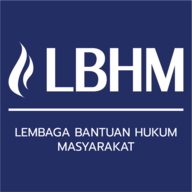
Member(s)
LBH Masyarakat (Community Legal Aid Institute)
on 5 May 2021
LBH Masyarakat (Community Legal Aid Institute) is a collective of individuals who believe that every human has potential to actively participate in legal aid, to uphold justice, and to contribute to the protection of human rights. LBH Masyarakat believes in equality, non-discrimination, and acknowledgement of inherent human dignity. LBH Masyarakat defends the right of every […]
2021
Indonesia
Document(s)
Abolition of the Death Penalty in the Eastern Caribbean and Barbados
on 15 December 2020
2020
Lobbying
Barbados
Trend Towards Abolition
More details Download [ pdf - 2611 Ko ]
Greater Caribbean for Life has launched its educational toolkit to assist activists and organisations as they work toward abolishing the death penalty in the Greater Caribbean. The production of this toolkit forms part of GCL’s activities under its EU partnered project to educate on death penalty abolition in the Eastern Caribbean and Barbados.
The launch of the toolkit is timely as a few of these target countries recently voted against adopting the UN Moratorium on the use of the death penalty and countries that had previously chosen to abstain have now firmly voted against the resolution.
GCL members condemn the rise of violent crime in our region and express solidarity and compassion with the victims of crime, however, we reject the notion that capital punishment will act as a deterrent or foster respect for life in our communities.
It is our hope that this toolkit will assist in promoting respect for the right to life for all human beings in the Caribbean region.
- Document type Lobbying
- Countries list Barbados
- Themes list Trend Towards Abolition
Document(s)
Prison Conditions in Jamaica
on 19 April 2011
2011
NGO report
Death Row Conditions
Jamaica
More details Download [ pdf - 396 Ko ]
In criminal justice matters, Jamaica has been rightly praised for its de-facto abolitionist
stance on the death penalty: nobody has been executed on the island since 1988.
However, the alternative to death is imprisonment. For many years, NGOs, the UN
Human Rights Committee, the Inter-American Commission on Human Rights, and
various independent and internal reports have expressed serious concern about the
conditions in which Jamaica detains its prisoners.
- Document type NGO report
- Countries list Jamaica
- Themes list Death Row Conditions
Document(s)
Living Under Sentence of Death
on 22 April 2022
2022
Academic report
NGO report
Bangladesh
Death Row Conditions
More details See the document
In 2019-20, The Department of Law at the University of Dhaka, in collaboration with the Bangladesh Legal Aid and Services Trust (BLAST) and The Death Penalty Project, conducted a study to investigate socio-economic characteristics and experiences of death row prisoners in Bangladesh.
Bangladesh continues to retain and implement the death penalty, with several executions taking place each year. Excluding laws relating to the defence forces and international crimes, there are currently 33 crimes punishable by death. 25 of these offences are non-lethal and arguably do not meet the threshold of the ‘most serious crimes’ under international law.
Inspired by similar studies in other countries, a pilot study was commissioned to examine the demographics and experiences of those sentenced to death. Consistent with those studies around the world, our findings evidence that the death penalty in Bangladesh is disproportionately used against the most vulnerable and marginalised sections of society.
72% of prisoners were classified as economically vulnerable
53% of prisoners were in low-paid work or unemployed
87% of prisoners had no qualifications beyond secondary school level
15% of prisoners had no formal education.
The study also raised serious concerns around the treatment of prisoners, the length of time prisoners spent in prison under the sentence of death and the integrity of criminal investigations and trial.
33% of prisoners’ families alleged their relative had been tortured in police custody, 5% suspected this and 15% refused to comment
60% of respondents were not satisfied with the trial process, with some claiming that the courts had failed to properly appreciate the evidence
On average it took over 10 years for death row cases to be disposed by the HCD (where sentences are confirmed). Prolonged time spent in isolation on death row, has been declared inhumane and degrading in many countries.
The sample consisted of 39 individuals on death row, evidence from their case files and face-to-face interviews with their families were conducted under rigorous ethical guidelines to reveal their profiles and experiences. Despite its small size, the sample is indicative of the general prison population allowing us to draw conclusions on possible trends.
- Document type Academic report / NGO report
- Countries list Bangladesh
- Themes list Death Row Conditions
Document(s)
Maldives – Committee Against Torture (LOIPR) – Death Penalty – June 2022
By The Maldivian Democracy Network (MDN) , on 21 July 2022
2022
NGO report
World Coalition
Cruel, Inhuman and Degrading Treatment and Punishment
Maldives
More details Download [ pdf - 1443 Ko ]
This report addresses the Maldives’ compliance with its human rights obligations with respect to the death penalty. Despite its long-standing, de facto moratorium on executions, the Maldives sentenced two people to death in 2019, after sentencing no one to death in 2018.[1] At the end of 2019, there were 19 people on death row in the Maldives – three of whom had exhausted their appeals and five of whom were juveniles when the crime was committed.[2] The Maldives sentenced another individual to death in 2022, which represented the first time the country sentenced a foreign national to death.[3] The continued use of the death penalty in sentencing is particularly concerning given evidence of due process violations, including the use of torture to obtain confessions, the lack of effective and accessible complaint mechanisms for detained individuals, the lack of an independent judiciary, and the use of the death penalty as a sentence for crimes committed by juveniles.
- Document type NGO report / World Coalition
- Countries list Maldives
- Themes list Cruel, Inhuman and Degrading Treatment and Punishment
Document(s)
Leaflet – World Day 2022
By the World Coalition Against the Death Penalty, on 24 June 2022
2022
World Coalition
arfrMore details Download [ pdf - 1095 Ko ]
Leaflet for the 20th World Day against the death penalty (2022), on torture and the death penalty.
- Document type World Coalition
- Available languages للیوم العالمي لمناھضة عقوبة الإعدام كتيب باللغة العربيةBrochure - Journée mondiale 2022
Document(s)
Impact of the World Coalition’s Strategic Plan 2018–2022
By World Coalition Agianst the Death Penalty, on 22 August 2023
2023
World Coalition
Trend Towards Abolition
frMore details Download [ pdf - 265 Ko ]
- Document type World Coalition
- Themes list Trend Towards Abolition
- Available languages Impact du Plan stratégique 2018-2022 de la Coalition Mondiale
Document(s)
Cuba – Committee Against Torture – Death Penalty – March 2022
on 21 March 2022
2022
NGO report
World Coalition
Cruel, Inhuman and Degrading Treatment and Punishment
Cuba
More details Download [ pdf - 250 Ko ]
Cuba has maintained a de facto moratorium on the imposition of the death penalty since its last reported execution in 2003. In 2010, Cuba’s Supreme Court commuted the death sentence of Cuba’s last remaining death row inmate. As of the date of this report, there is no record of an individual currently sentenced to death. Although a de facto moratorium is in place, Cuba has not committed to a de jure abolition of the death penalty, citing national security concerns.
- Document type NGO report / World Coalition
- Countries list Cuba
- Themes list Cruel, Inhuman and Degrading Treatment and Punishment
WD2020_Poster_BD_FR
on 26 February 2021
2021
WD2020_Poster_BD_RU
on 26 February 2021
WD2020_Poster_BD_ES
on 26 February 2021
WD2020_Poster_BD_AR
on 26 February 2021
19th-world-day-Journalists_media_parley_Lagos
on 3 December 2021
2021
Document(s)
Sentenced to Death Without Execution
on 15 December 2020
2020
NGO report
Antigua and Barbuda
Barbados
Dominica
Grenada
Saint Kitts and Nevis
Saint Lucia
Saint Vincent and the Grenadines
Trend Towards Abolition
More details Download [ pdf - 1597 Ko ]
This research is a contribution towards understanding why six small, independent island nations in the
Eastern Caribbean – Antigua and Barbuda, Dominica, Grenada, St Kitts and Nevis, St Lucia, and St
Vincent and the Grenadines, all members of the OECS – and the neighbouring island of Barbados retain
the death penalty in their criminal statutes, and yet have not executed anyone sentenced to death for a
very long time. With the exception of St Kitts and Nevis, where an execution took place in 2008, no-one
has been judicially executed in any of the other countries for more than 20 years – and in Dominica,
Grenada, St Lucia and Barbados for more than 30 years. Furthermore, death sentences have been imposed
within the past 10 years only in St Lucia and Barbados, and in four of these seven nations no-one is under
sentence of death on ‘death row’ at the time of writing.
The questions posed by this publication are: why do these countries hang on to capital punishment
and what are the barriers and hindrances to the complete abolition of capital punishment by these
nations
- Document type NGO report
- Countries list Antigua and Barbuda / Barbados / Dominica / Grenada / Saint Kitts and Nevis / Saint Lucia / Saint Vincent and the Grenadines
- Themes list Trend Towards Abolition
Document(s)
Defending Women and Transgender Persons Facing Extreme Sentences: A Practical Guide
on 14 January 2022
2022
Legal Representation
Legal Representation
Women
frMore details See the document
Written by a team including experts in the fields of capital defense, gender rights, gender-sensitive mitigation and the rights of transgender persons, the guide includes sections on gender-based violence, women’s mental health, prison conditions, discrimination in the legal system, working with the media, and how to build a gender-sensitive team. It also includes a step-by-step gender-sensitive interview protocol that builds on resources developed by the anti-violence community and is tailored to the needs of defense teams.
- Document type Legal Representation
- Themes list Legal Representation / Women
- Available languages Défendre les femmes et les personnes transgenres confrontées à des peines extrêmes
Document(s)
The Use of the Death Penalty as a Bargaining Chip in Innocence Cases
By Claudia I. Salinas, California Western International Law Journal, on 1 February 2024
2024
Academic Article
United States
More details See the document
Published in 2023.
While 70% of the world’s countries have abolished the death penalty, also known as capital punishment, much of the United States continues to use it in its criminal legal proceedings.According to the Death Penalty Information Center, at least 190 people were exonerated prior to their fated execution date after being wrongly convicted and sentenced to death in the United States. There is no way to tell how many of the 1,562 people, who have been executed in the United States, were actually innocent. As there are wrongful convictions still happening today, it is no surprise that most countries consider the death penalty a human rights issue.
- Document type Academic Article
- Countries list United States
Article(s)
Logistics and Partnership Manager
By World Coalition Against the Death Penalty, on 3 February 2020
The World Coalition Against the Death Penalty recruits a logistics and partnership manager for a full time permanent position starting as soon as possible.
2020
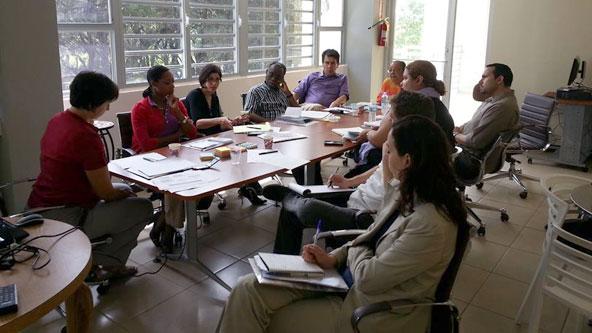
Article(s)
Caribbean network fleshes out plans for abolition
By Emile Carreau, on 16 January 2014
The Executive Committee of the Greater Caribbean for Life (GCL) network, constituted in October 2013, met in San Juan, Puerto Rico on January 11 and 12 to devise strategies to combat the death penalty in the region.
2014
Moratorium
Trinidad and Tobago
Article(s)
Program Manager
By World Coalition Against the Death Penalty, on 15 October 2018
The World Coalition Against the Death Penalty recruits a program manager for a full time permanent position starting in January 2019.
2018
Article(s)
Taiwan activists battle in death penalty-triggered political crisis
on 19 March 2010
After Taiwan’s justice minister was forced to step down for not signing execution warrants, local and international abolitionists rushed in to restore a balanced debate and protect the country’s 44 death row inmates.
2010
Moratorium
Public Opinion
Taiwan
Taiwan
Article(s)
Joint Italian-Congolese effort against capital punishment
on 16 June 2009
World Coalition member organisation Hands Off Cain has launched a campaign targeting DRC’s opinion leaders. The government regards the renovation of the prison system as a prerequisite for abolition.
2009
Democratic Republic of the Congo
Italy
Moratorium
Article(s)
World Day: inventiveness against the death penalty
on 23 October 2007
France, Peru, Togo, India… Abolitionist activists sounded a rallying call for the 5th World Day Against the Death Penalty across numerous countries via a variety of initiatives.
2007
Denmark
Mongolia
Peru
Public Opinion
Republic of Korea
Taiwan
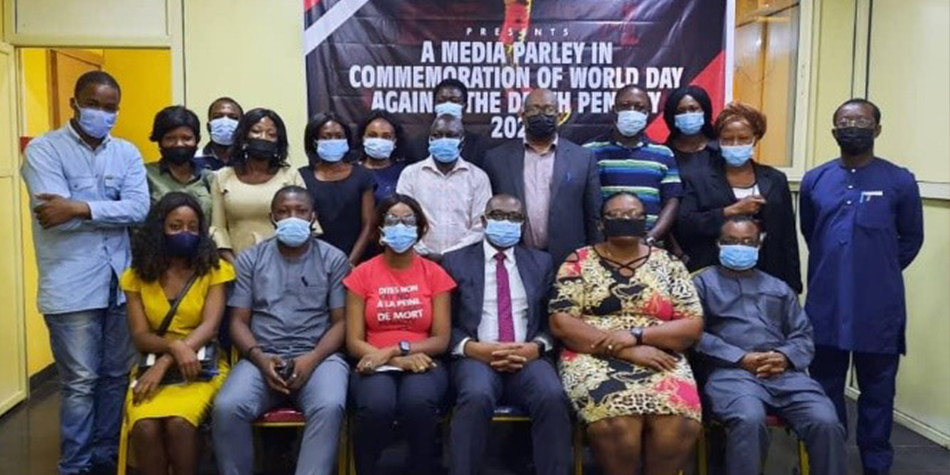
Article(s)
Women Sentenced to Death Showcased on the 19th World Day Against the Death Penalty
By Elise Garel, on 3 December 2021
With the theme “Women sentenced death: an invisible reality”, the 19th World Day Against the Death Penalty aimed to highlight the issues faced by women who are sentenced to death, executed, pardoned or exonerated around the world.
2021
Cameroon
Indonesia
Iran (Islamic Republic of)
Morocco
Nigeria
Pakistan
Sierra Leone
United States
Women
Article(s)
Activists from Burundi, Rwanda and DR Congo join forces
on 3 December 2008
The Great Lakes Regional Coalition Against the Death Penalty held its first meeting on November 17 in Kinshasa. Its lobbying efforts have accelerated Burundi’s legislative process.
2008
Burundi
Democratic Republic of the Congo
Moratorium
Rwanda
Article(s)
Activists oppose the death penalty across Asia
on 30 October 2008
Although European activists were slow to take action on World Day Against the Death Penalty, their Asian counterparts showed their strength, especially in the World Coalition’s target countries.
2008
India
Japan
Mongolia
Pakistan
Public Opinion
Republic of Korea
Taiwan
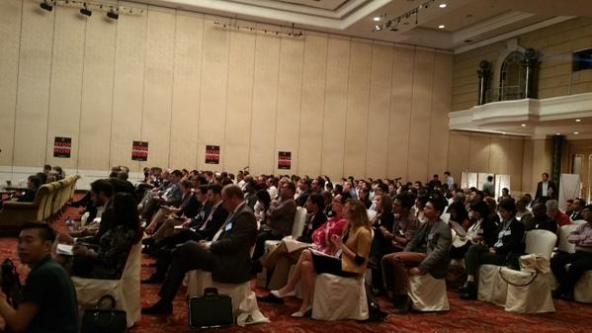
Article(s)
“We need to feel the reality of the death penalty”
By Lauranne Mailhabiau, on 22 June 2015
So said Raphael Chenuil Hazan, director of ECPM, at the opening ceremony of the Asian Regional Congress in Kuala Lumpur.
2015
Indonesia
Malaysia
Public Opinion
Taiwan
Page(s)
Become a member
on 22 June 2020
Only legal entities can join the World Coalition Against the Death Penalty In accordance with article 5.1. of its Bylaws, the World Coalition welcomes organizations that share the aim of the universal abolition of the death penalty. What the World Coalition offers its members What the World Coalition does not offer its members How members […]
2020
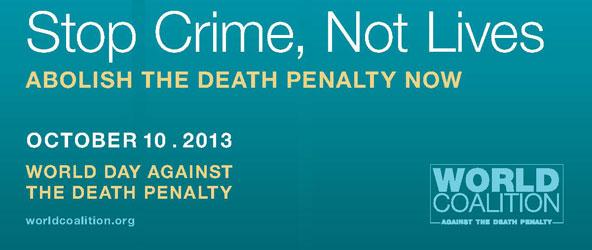
Article(s)
Calendar of events for World Day
By WCADP, on 10 September 2013
On 10 October 2013, the World Day Against the Death Penalty is focusing on the death penalty in the Greater Caribbean. Browse the schedule and the map to prepare and promote the events planned around the world on the big day.
2013
Cruel, Inhuman and Degrading Treatment and Punishment
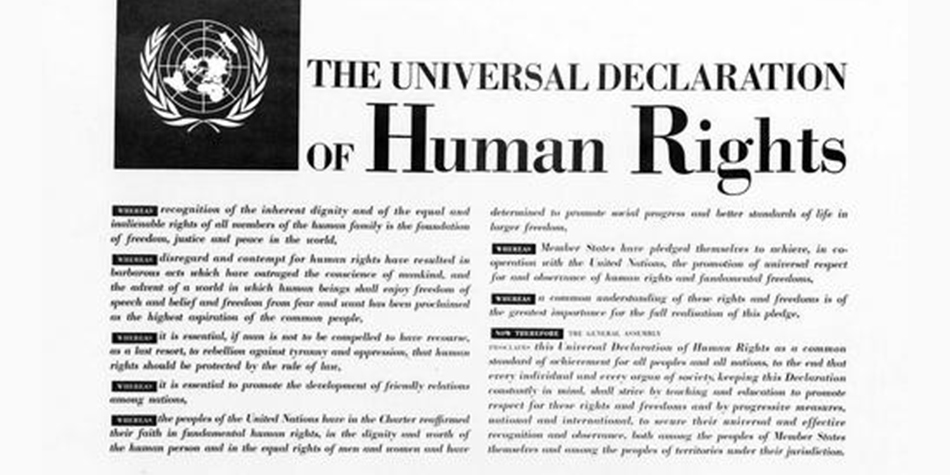
Article(s)
Statement on the occasion of the International Human Rights Day
By World Coalition Against the Death Penalty, on 10 December 2020
Humanity and the global human rights movement, including the World Coalition Against the Death Penalty, are celebrating the 72nd anniversary of the adoption of the Universal Declaration of Human Rights on 10 December 1948. This day has been commemorated by the United Nations as International Human Rights Day.
2020
Moratorium
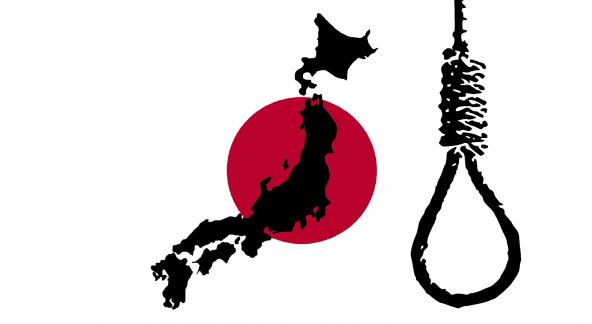
Article(s)
Regarding the execution in Japan of seven people
By World Coalition Against the Death Penalty, on 10 July 2018
STATEMENT – WORLD COALITION AGAINST THE DEATH PENALTY The World Coalition Against the Death Penalty would like to express its sympathy and support to all courageous anti-death penalty activists who have fought bravely to try to prevent the executions of seven people in Japan on the same day, on 6 July. The World Coalition calls […]
2018
Japan
Article(s)
10.10.10 World Day Against the Death Penalty – USA special
on 6 August 2010
On 10 October 2010, the World Day Against the Death Penalty will focus on the USA. There are two months left to prepare and promote the events planned around the world on the big day.
2010
Cruel, Inhuman and Degrading Treatment and Punishment
United States
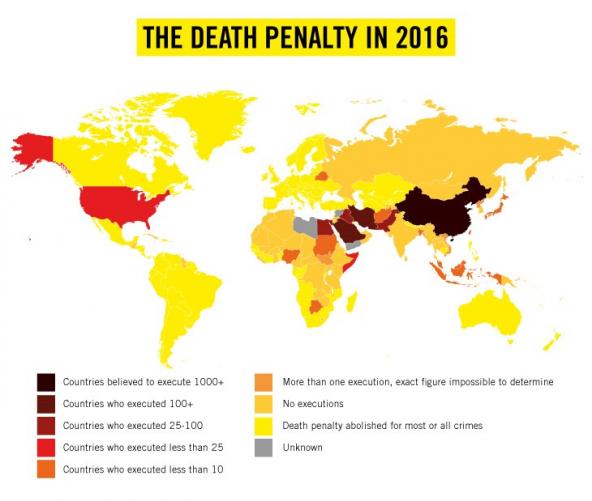
Article(s)
Death Sentences and Executions in 2016
By Amnesty International, on 11 April 2017
Amnesty International published its 2016 global review of the death penalty on Tuesday, April 11th 2017.Excluding China, states around the world executed 1,032 people in 2016. China executed more than all other countries in the world put together, while the USA reached a historic low in its use of the death penalty in 2016.
2017
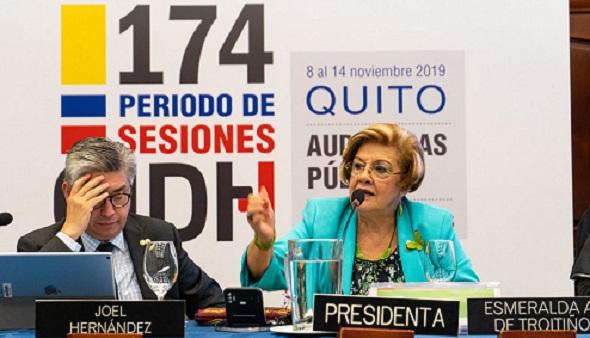
Article(s)
The Inter-American system commits to see the end of the death penalty
By World Coalition Against the Death Penalty, on 13 January 2020
In November 2019, Ecuador hosted a series of high level meetings of the Organisation of American States (OAS), including the Third Forum of the Inter-American Human Rights System and the 174th Period of Sessions of the Inter-American Commission on Human Rights (IACHR), during which abolition of the death penalty was on the agenda.
2020
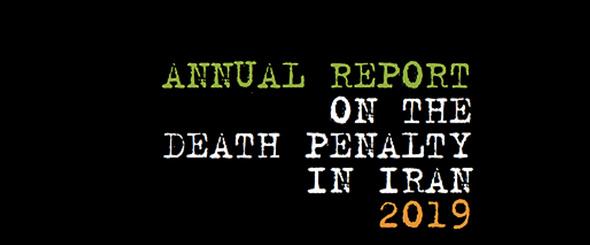
Article(s)
Iran: Annual report on the death penalty 2019
By Iran Human rights and ECMP (Together Against the Death Penalty), on 4 May 2020
Iran Human Rights (IHR) and ECPM (Together Against the Death Penalty) published its 12th report on 31 march 2020. The report provides an assessment and analysis of the death penalty trends in 2019 in the Islamic Republic of Iran.
2020
Iran (Islamic Republic of)
Article(s)
Country-by-country death penalty data now available
By Center for International Human Rights at Northwestern University School of Law, on 19 April 2011
A new statistic and legal database designed by Northwestern University in partnership with the World Coalition offers a unique view of the use of capital punishment in more than 90 states.
2011
EN-KitMobilisationWD2013-1.pdf
on 8 September 2020
2020
SierraLeone-EN-1.pdf
on 8 September 2020
EN_2013WorldDayLeaflet-1.pdf
on 8 September 2020
CampaignUpdate11-May2013-EN-1.pdf
on 8 September 2020
Morocco-FR-1.pdf
on 8 September 2020
Togo-EN-1.pdf
on 8 September 2020
CoteIvoire-FR-1.pdf
on 8 September 2020
Madagascar-EN-1.pdf
on 8 September 2020
CampaignUpdate13-Nov2013-EN-1.pdf
on 8 September 2020
KitCitiesForLife2015-EN-1.pdf
on 8 September 2020
Congo-ES-1.pdf
on 8 September 2020
Flyer-oct-1-13-TT-v2-1.pdf
on 8 September 2020
LeafletCitiesForLife-FR-1.pdf
on 8 September 2020
CoalicionPuertorriquenaContraLaPenaDeMuerte-InformeAnual2015-ES-1.pdf
on 8 September 2020
PRI_OralStatement-CPSDPanel-HRC24-1.pdf
on 8 September 2020
FR_FactSheet2012WD-1.pdf
on 8 September 2020
EN-Death_Penalty_Manual_-_final_copy_01_16_13-1.pdf
on 8 September 2020
2012WorldDayPoster_FR-1.pdf
on 8 September 2020
EN-2013WorldDayPetition-Barbados-TT-1.pdf
on 8 September 2020
CampaignUpdate12-Sept2013-EN-1.pdf
on 8 September 2020
FR-GuidePeda2011-1.pdf
on 8 September 2020
CADP2012report-EN-1.pdf
on 8 September 2020

